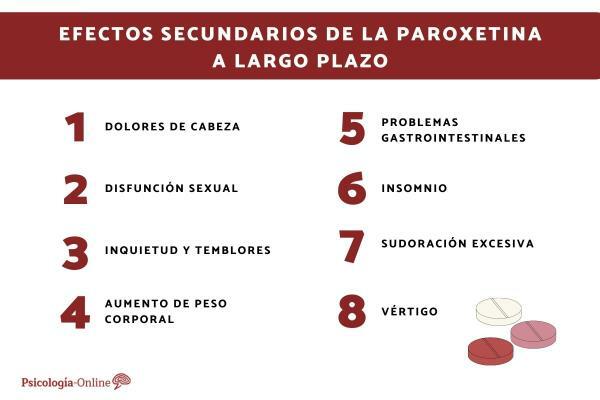
Antidepressants are one of the most widely prescribed psychiatric medications in our society. Many people take antidepressants on a daily basis, but there is also a high prevalence of abandonment of treatment, either due to forgetfulness or because the person believes that it is no longer necessary because find well. Stopping treatment with antidepressant drugs abruptly can lead to major health problems. Sudden withdrawal of the drug can lead to withdrawal symptoms, particularly if the person has been using the drug for more than four weeks. In this Psychology-Online article, we will explain how to stop antidepressants and what are the side effects and physical symptoms that appear after stopping antidepressants.
Stopping antidepressants suddenly is one of the mistakes made when taking antidepressants. Stopping antidepressants suddenly can lead to the so-called "discontinuation syndrome." It refers to a withdrawal syndrome, however it was decided to name it with another nomenclature to record that the antidepressants do not general addiction and that the symptoms presented are very different from the abandonment of consumption of other substances such as alcohol or opioids.
After stopping the drug, a series of side effects appear within a few days, which can last up to several weeks. Sometimes the side effects of stopping antidepressants suddenly can be confused with a recurrence of the depressive disorder, however, if the drug is restored they disappear quickly. On the contrary, if it is a relapse, the disappearance of the symptoms occurs gradually.
Among the side effects of stopping antidepressants suddenly, we can find somatic side effects, which are manifested from physical and psychological symptoms.
Stopping antidepressants suddenly has a number of side effects. Among them, a set of physical symptoms that can last for a few days. The physical symptoms when stopping more commonly given antidepressants are as follows:
- Dizziness
- Headaches
- Fatigue
- Sickness
- Sleep disorders such as insomnia
- Flu-like symptoms
- Weight changes (increase or decrease)
- Reappearance of depressive symptoms
- Electric shock sensations
The psychological symptoms presented after the withdrawal of the drug can lead to confusion, because their symptoms occur in a way very similar to depressive symptoms. The psychological symptoms that occur more frequently when stopping antidepressants are the following:
- Emotional and mental turmoil
- Mood lability
- Difficult to focus
- Memory problems
- Irritability
- Confusion
- Feeling of being out of place in reality
It is understandable that people who have been taking antidepressant psychotropic drugs for long periods of time want to stop taking them as soon as possible. However, as noted above, suddenly stopping the drug can cause large physical and psychological consequences, in addition to a greater possibility of relapse of depressive symptoms with weather. Here we explain the correct way to withdraw the drug, that is, how to stop antidepressants.
If you are on drug treatment with antidepressants, such as with tricyclic antidepressants, and you wonder how I can stop the antidepressants correctly? You should follow these tips:
1. Information
Are you informed about the drug you are taking? It is important to take into account the benefits that the drug provides in your daily life, but it is also necessary to assess the adverse effects it produces. On the other hand, it is important to keep in mind the required duration of your treatment. Against these variables: the benefits, disadvantages and medical indications duration, you will be able to assess whether discontinuing the drug is the best option in your situation.
2. Reasons
Question yourself what is the reason you want to stop the drug. The decision to want to stop taking the drug can be due to multiple factors. First, a perception of improvement may appear that prompts the desire to stop taking the medication. Second, it could be the desire for remission due to the side effects that the particular drug produces. On the other hand, it could be that the person does not see pharmacology as the best means of improvement. Finally, there could be a sudden withdrawal of the drug and as a consequence the appearance of symptoms associated with it, due to forgetting not to take the medication in the doses and hours prescribed.
3. Follow the professional's instructions
Faced with the desire to stop taking the medication due to a perception of improvement, it is essential ask your doctor or psychiatrist that your case takes its assessment. This person will assess the current circumstances and will tell you what they think is the best option at the current time. If you agree that the best option is to stop taking the psychotropic drug, he will tell you how to stop taking antidepressants to reduce the clinical impact when you stop taking it. Surely, the withdrawal of it will be done with a gradual decrease in the dose, over a period of several weeks. This greatly reduces the chances of the appearance of a discontinuity syndrome and, if it does appear, you can readjust the dose to minimize them.
If the desire for remission is due to the high number of side effects produced by the given drug, it is also It is important to visit your doctor or psychiatrist, so that he can assess the situation and establish a drug change antidepressant.
Faced with these two situations, it is very important to go to the periodic reviews with the person who handles your case, so that he can correctly monitor the withdrawal or change of the drug and can help you with any difficulty or discomfort.
4. In case of forgetfulness
In the event that discontinuity symptoms appear due to the forgetting to take medicationIt is important to be aware of this and of the importance of following the treatment with the prescribed indications of your doctor or psychiatrist. Against this, they can be established strategies for not forgetting to take medication such as: an alarm on your mobile, telling a family member to remind you or a post-it somewhere that is easy for you to see.
5. Supplement with psychotherapy
Finally, faced with the desire to stop taking the medication without a remission of symptoms, a possible alternative would be consider another treatment, such as psychotherapy. Normally, the recommendation for the treatment of depression is a combination therapy between pharmacological and psychotherapy. However, there are many psychotherapies that have proven their effectiveness in treating depression, without taking antidepressants. An example of this is the cognitive behavioral therapy, which has been shown to promote great improvements in depressive disorders.
This article is merely informative, in Psychology-Online we do not have the power to make a diagnosis or recommend a treatment. We invite you to go to a psychologist to treat your particular case.


